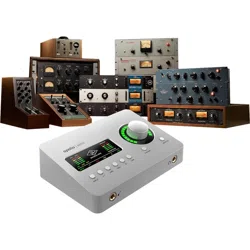Loading ...
Loading ...
Loading ...

Apollo Solo Manual Working With Apollo Solo 56
UAD Plug-Ins: Console versus DAW
There are important fundamental differences between using UAD plug-ins within Console
versus within a DAW. Apollo Solo features two distinct methods for using UAD plug-ins:
Console processing (Realtime) – Low-latency hardware input monitoring and recording
with Realtime UAD Processing via UAD plug-ins that are loaded within Console.
DAW processing (Buffered) – DSP-accelerated processing via UAD plug-ins in VST, AAX
64, or Audio Units formats that are loaded within a DAW.
These two methods are not a switched mode, but instead simply depend on which
host application, either Console or a DAW, contains the UAD plug-in(s). Note that
both methods can be used at the same time for maximum flexibility. Each method is
explained in greater detail below.
UAD Processing in Console (Realtime)
UAD plug-ins run in realtime, without discernible latency, only when used within
Console. Hardware input monitoring with Realtime UAD Processing via Console is
optimum for artists and engineers that need to monitor and capture performances
without DAW I/O buffering latency and its associated hindrances.
Important: UAD plug-ins used within Console only run on the DSP within Apollo
Solo. If UAD-2 DSP accelerators are active in the same system, the DSP on those
devices cannot be used to process UAD plug-ins in Console.
The special Realtime UAD Processing functionality is achieved via Apollo Solo’s unique
ultra-low latency DSP+FPGA+Console design. Although every audio interface has
undetectable latency that is inherent to the A/D–D/A process, routing Apollo Solo’s input
signals through UAD plug-ins within Console does not add to this inherent latency.
Up to five UAD plug-in instances can be inserted serially (aka, stacked or chained) on
each of Console’s inputs and/or auxiliary buses at the same time, without adding to the
inherent A/D–D/A latency.
Console inputs and stereo mix buses (monitor, headphone, auxiliary), with or without
Realtime UAD Processing, are routed into the DAW via Apollo Solo’s device drivers.
These channels can be optionally recorded as either processed (wet) or unprocessed (dry)
audio using the Insert Effects feature in Console (see Insert Effects Overview).
Console Processing Notes
• Console controls Apollo Solo’s Unison and Realtime UAD Processing features.
These are special functions that are available only when UAD plug-ins are inserted
within Console. To activate these features, simply insert UAD plug-ins within
Console.
• As with all UAD devices, Apollo Solo can only load UAD plug-ins, which are
specifically designed to run on UAD DSP. Host CPU-based (native) plug-ins
cannot run on UAD DSP or be inserted in Console.
• Upsampled UAD plug-ins add negligible latency (usually indiscernible) when used
within Console or a DAW. See
Latency Basics for more information.
Loading ...
Loading ...
Loading ...
